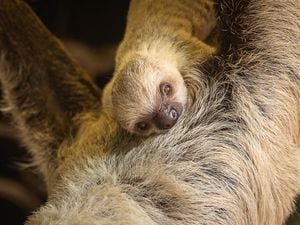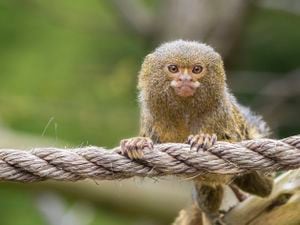Baby sloth surprises zookeepers with speedy birth
The sloth has been named Terry after long-serving keeper Terry March, who has cared for the animals at London Zoo since 1973.

A baby sloth has surprised keepers at ZSL London Zoo with its speedy birth.
Keepers were aware that the sloth’s mother, Marilyn, was due any day but continued to make breakfast for other animals, believing she was comfortably tucked away in her den.
It was only when they returned less than an hour after checking on her that they found she had gone into labour and given birth at a speed uncharacteristically fast for the famously slow-moving species.
Sloth keeper Marcel McKinley said: “We looked in on her first thing and there was no baby – and no sign at all that she was in labour.
“Less than an hour later, I spotted something that looked like a tiny arm tucked into Marilyn’s tummy; I called the rest of the team to confirm my eyes weren’t playing tricks on me.

“They arrived just in time to see her turn around in the tree and give us the perfect view of her healthy newborn – who she’d quietly delivered, with no fuss at all, while we’d been chopping up sweet potato for her breakfast.
“She clearly took the whole thing in her stride.”
The two-week-old baby has been named Terry and is “doing really well” as keepers await confirmation of its sex by DNA analysis.
Mr McKinley said: “(The name is) after one of the zoo’s longest-serving zookeepers – our colleague Terry March, who has devoted his whole life to caring for threatened species and educating the public about wildlife.”

Terry March, 65, joined ZSL London Zoo as a trainee zookeeper in 1973 and has looked after the animals ever since – including caring for the sloths for the past 15 years.
Once the baby’s sex is confirmed, its details will be added to the European Studbook (ESB), part of a co-ordinated breeding programme for two-toed sloths.
The nocturnal animals, which are native to South America, live in London’s only living rainforest at the zoo.





